» posted on Thursday, December 17th, 2020 by Linda Lou Burton
The Day I Crossed the Andes in a Taxi
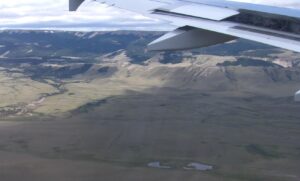 Christmas in Antarctica originally posted by Linda Lou Burton December 17, 2005 from Balmaceda & Puerto Chacabuco, Chile – I’d decided to keep my watch on Seattle time until I reached the ship. The plane landed in Balmaceda at 11:30 AM, coming in over green fields, little lakes, farmhouses, sheep. It was rural and sparse and, I soon discovered, windy. I asked the flight attendant to help me get my carryon bag down the steps but even on the ground I was caught sharply by the gusts.
Christmas in Antarctica originally posted by Linda Lou Burton December 17, 2005 from Balmaceda & Puerto Chacabuco, Chile – I’d decided to keep my watch on Seattle time until I reached the ship. The plane landed in Balmaceda at 11:30 AM, coming in over green fields, little lakes, farmhouses, sheep. It was rural and sparse and, I soon discovered, windy. I asked the flight attendant to help me get my carryon bag down the steps but even on the ground I was caught sharply by the gusts. 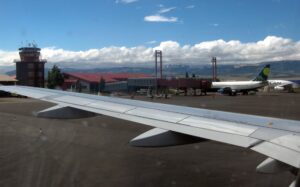
There was nothing near the airport, no town, no store, not even any houses. The baggage carousel was easy to spot in this tiny terminal, and I saw my fancy-schmancy circling as soon as I arrived. What I did not see was a uniformed Norwegian Cruise Lines official standing with a Voyage of Discovery sign. I wandered out into the main hallway, looking hopefully for something that would indicate a connection. “Taxi” I was offered, by several smiling hopefuls. I shook my head no and went to stack my luggage. Perhaps after a drink of water I could think what to do.
Then I heard my name.
I waved my hand and saw a young man, holding a slip of paper from which he was phonetically calling out the words he saw in print. “Leen-da?” “Yes! I’m Linda!” I yelled across at him and he immediately rushed to take my bags. He began pulling them towards the door until I put out my hand and ordered “Stop! Restroom!” He shook his head, puzzled. “No Eenglish,” he told me. “No Spanish!” I replied. I tried to think of a gesture that would indicate my need for a restroom stop. A woman on a nearby bench began to laugh as I continued “Restroom?” and he continued “No Eenglish.” She said something to him I did not understand and then he said to me “Bathroom?” I nodded, and he pointed around the corner. I left my bags on faith and went to pee.
When I returned my bags were gone. But there he stood, waiting to escort me out the door. I desperately needed a drink of water, but couldn’t bear to go through another round of misunderstandings. And where were my bags? He led me to a taxi at the curb, and opened the door. “What is your name?” I asked, extending my hand in handshake mode, “and where are we going?” Amazingly he seemed to understand, and offered his hand in return. “I am Marco,” he said.
We then began a game of Charades. “Where?” I pointed towards the road. “Ship!” he answered. “How far?” I asked, extending my hands apart. He shook his head. “How long?” I asked, tapping on my watch. “Two ow-hers,” he said, adding a distance in kilometers, which had no meaning to me.
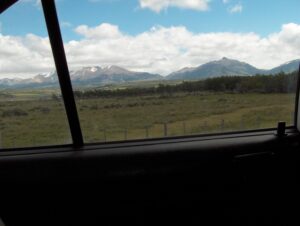 I was still curious about my bags and pointed to the trunk. “Can I have my black bag up front?” I asked. I don’t know if he understood, but he opened the trunk. My three bags were safely stowed, and I reached for the carryon, which he quickly retrieved and put into the back seat for me. I was beginning to feel a little more comfortable now, and after 30 hours with almost no sleep, welcomed any offered help. I settled in for the ride.
I was still curious about my bags and pointed to the trunk. “Can I have my black bag up front?” I asked. I don’t know if he understood, but he opened the trunk. My three bags were safely stowed, and I reached for the carryon, which he quickly retrieved and put into the back seat for me. I was beginning to feel a little more comfortable now, and after 30 hours with almost no sleep, welcomed any offered help. I settled in for the ride.
Marco had only driven two or three miles when he pulled the car to the side of the road and stopped. The highway was a smoothly paved two-lane, but there was no other traffic. “I wonder if anyone will ever find my body,” I thought, more resigned than worried. “I hope my brother remembers all the insurance policies and everything gets distributed correctly.”
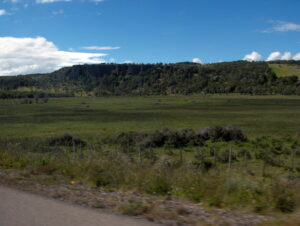 Marco turned to face me in the car, his face wrinkled in deep concentration. Then he gestured to the landscape and said “Big fire!” I looked around to see remains of tree trunks scattered on the hillsides, a sight of devastation like I had seen before. “Oh!” I nodded. “How long ago?” He looked worried at the question, and narrowed his eyes, thinking. Finally he answered “One hundred years!” I was excited at our progress, so asked another question. “What kind of trees? Trees? What kind?” More thinking, and then he smiled and shouted “El Pino!” “Pine trees!” I shouted back, laughing. We smiled at each other, satisfied. We’d had a conversation.
Marco turned to face me in the car, his face wrinkled in deep concentration. Then he gestured to the landscape and said “Big fire!” I looked around to see remains of tree trunks scattered on the hillsides, a sight of devastation like I had seen before. “Oh!” I nodded. “How long ago?” He looked worried at the question, and narrowed his eyes, thinking. Finally he answered “One hundred years!” I was excited at our progress, so asked another question. “What kind of trees? Trees? What kind?” More thinking, and then he smiled and shouted “El Pino!” “Pine trees!” I shouted back, laughing. We smiled at each other, satisfied. We’d had a conversation.
I took my camera from my pack and began snapping pictures of the countryside as we rode along. This seemed to please Marco, perhaps because I was interested in the place that was his home. He crossed the highway at a gravel turnout and opened the door for me. He grinned as he gestured towards a waterfall, splashing into a rushing stream. “Big fish,” he said. I snapped more pictures.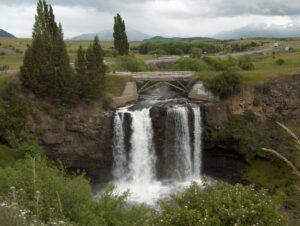
The landscape looked much like the wide open spaces of Wyoming to me, or eastern Washington state, and something very familiar was blooming everywhere. 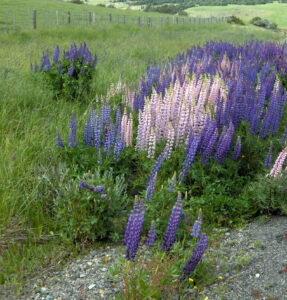 Lupine! Pinks and blues and purples and a soft cream color I’d never seen before. I tapped Marco on the shoulder and waved my camera as we passed a particularly beautiful field . “Flowers!” I said. He found a stopping place and let me out again. “So beautiful!” I said, “thank you.” Marco smiled.
Lupine! Pinks and blues and purples and a soft cream color I’d never seen before. I tapped Marco on the shoulder and waved my camera as we passed a particularly beautiful field . “Flowers!” I said. He found a stopping place and let me out again. “So beautiful!” I said, “thank you.” Marco smiled.
In about an hour we came to a town, identified by sign as Coihaique. This place I had read about in the tour materials. Maybe we were getting close? Marco drove through the downtown area, pointing out stores, circling the park where families were picnicking, children swinging. He stopped at a monument and pointed to the figures.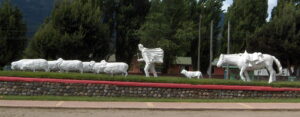
Was his English getting better? Or was my ear finally getting the Spanish? I’m not sure, but I seemed to absorb what was going on around me. At the gas station, I commented on his car. “Toyota!” I said. “I have a Toyota too.” “Good car,” Marco said.
We changed highways in Coihaique, and the landscape became steeper and more rugged, the road more challenging. Marco stopped at a lookout point high on the hill so that I could see the town laid out in the valley below. It reminded me of a place I once stood in Yosemite National Park. Now here I was, in the midst of the Andes.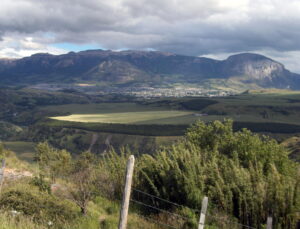
A few miles more down the road, Marco stopped to show me a rock outcropping that extended for several miles, high above the valley. “Great Wall,” he said. “Oh,” I finally understood, “the Great Wall, like China.” He nodded. Language is a great wall, I thought to myself. I wished that I could ask Marco about his family, his work, the places he had been. But I did not know how.
The road wound down now, and suddenly around a curve there was a road block. Marco pulled his taxi to the side of the road as the uniformed officer approached. Had we been speeding? I was not sure. Marco began to pull out papers and answer questions. All I could see was the elbow-length white leather gloves on the officer’s hands. Then he waved us on. “Normal?” I asked. “Sometimes,” Marco replied.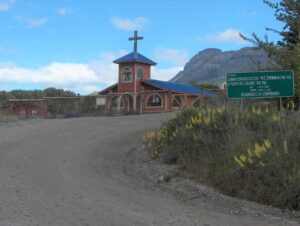
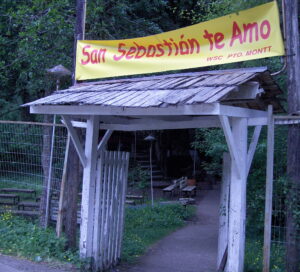 There was a river to our left. The river valley flattened and widened and campsites began to appear. I spotted obvious places for fishing and rafting. It reminded me of the Ocoee River in eastern Tennessee. “Simon River,” Marco indicated to me. “Big river.” We stopped at two more waterfalls, and two roadside altars. “San Sebastian,” Marco said, “saint of travelers.” I snapped more pictures.
There was a river to our left. The river valley flattened and widened and campsites began to appear. I spotted obvious places for fishing and rafting. It reminded me of the Ocoee River in eastern Tennessee. “Simon River,” Marco indicated to me. “Big river.” We stopped at two more waterfalls, and two roadside altars. “San Sebastian,” Marco said, “saint of travelers.” I snapped more pictures.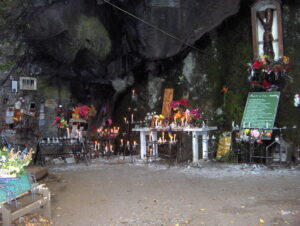
Another hour had passed, and we were approaching another town. Puerto Aisen, I saw on a sign. A large bridge loomed ahead. “Simon?” I asked, as we crossed over. “Aisen,” Marco said back. I spotted a fortified building on the left. “Jail?” I said, hoping he’d reply with the Spanish word. “Bad pipples,” he laughed.
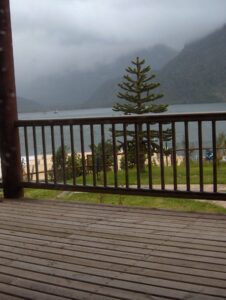 Now there was a large body of water on the right. “River?” I asked. “Ocean,” he said. Ocean! Was I almost to my ship? The answer was yes. In ten minutes more we drove into a small village surrounded by ice-capped mountains. Puerto Chacabuco, at last. Marco stopped the taxi in front of a beautiful building, wood and glass overlooking a narrow channel of water. There was no neon marquee, but I was sure I’d reached a destination of sorts. A handsome young man in a black uniform with golden epaulets met us at the door.
Now there was a large body of water on the right. “River?” I asked. “Ocean,” he said. Ocean! Was I almost to my ship? The answer was yes. In ten minutes more we drove into a small village surrounded by ice-capped mountains. Puerto Chacabuco, at last. Marco stopped the taxi in front of a beautiful building, wood and glass overlooking a narrow channel of water. There was no neon marquee, but I was sure I’d reached a destination of sorts. A handsome young man in a black uniform with golden epaulets met us at the door.
“Welcome Ms Linda! We have been expecting you! Your room is ready!” he said, in English. I turned to Marco. “Thank you so much, that was such a beautiful ride,” I said. Then I said to my host, “Has he been paid?” “Oh yes, the tour company has taken care of that,” my host replied. “He is free to go now.”
“Then please tell him how much I appreciate everything he did for me, please let him know it was very good, and please help me to give him a very good tip.” I pulled out all of the Chilean pesos I had and laid them on the counter. The host removed some bills and spoke to Marco in Spanish. Marco nodded as took the money. Then he shook my hand, smiled, and drove away.
Read More
Balmaceda, Chile – https://www.rutadelosparques.org/en/balmaceda/
Coyhaique, Chile – https://www.rutadelosparques.org/en/coyhaique/
Puerto Aisen, Chile – https://www.rutadelosparques.org/en/puerto-aysen/
Puerto Chacabuco, Chile – https://www.rutadelosparques.org/en/puerto-chacabuco/
